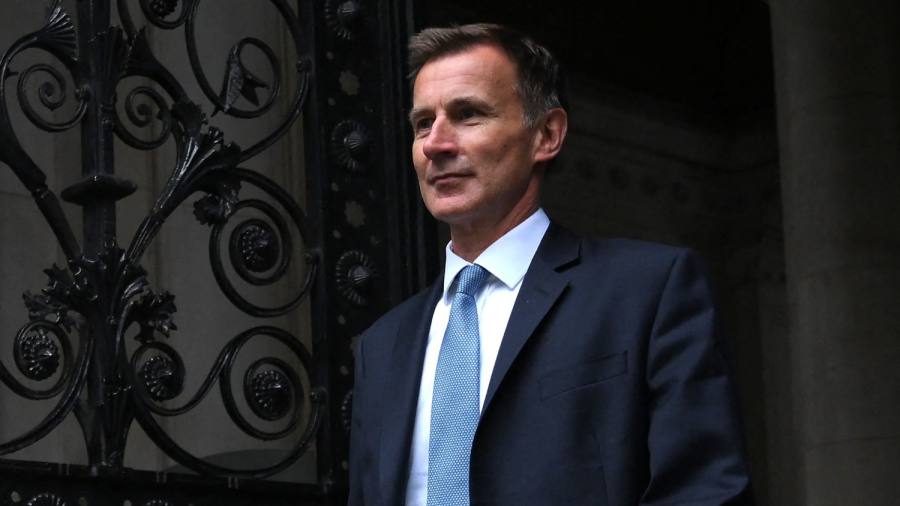
Chancellor Jeremy Hunt is to propose a “stealth” rise in income tax for millions of people after the next election to help fill a fiscal hole of £40bn, but his debt-cutting fiscal statement due on October 31 could be delayed.
Hunt is expected to extend the current freeze in income tax thresholds and allowances into the next parliament, according to two government sources briefed on his plan, raising about £5bn a year by 2027-28.
He will use his medium-term fiscal plan, scheduled for Halloween, to prove to markets and the Office for Budget Responsibility, the independent fiscal watchdog, that he has a strategy to bring debt under control.
But Downing Street said on Friday the timetable for the plan could slip following Liz Truss’s resignation as prime minister and the Tory leadership contest that is now under way.
“We are working in preparation for the 31st but obviously the decision on proceeding with that and with that timetable would be for the new prime minister,” a Number 10 spokesperson said.
Hunt hopes to stay in post whoever wins the Tory leadership contest and his fiscal plan is almost complete; he previously backed former chancellor Rishi Sunak in the contest to succeed Boris Johnson.
Sunak, who will campaign for the premiership on a platform of fiscal responsibility, is likely to broadly endorse Hunt’s plan and will pledge to restore economic credibility.
Johnson, who has favoured higher public spending in the past, could find it more uncomfortable. Sunak quit Johnson’s cabinet in July, claiming the former prime minister could not take tough fiscal decisions.
Government officials say it is likely the October 31 date could slip if the current leadership contest includes a run-off vote by party members, which will lead to a result being announced on October 28.
Truss’s successor will want to approve any economic package, but if a new leader emerges on Monday after a round of voting by MPs, the fiscal event could take place as planned.
Hunt is keen to deliver his fiscal statement before the next meeting of the Bank of England’s Monetary Policy committee on November 3, which will take a key decision on how far to raise interest rates.
A big “stealth” tax rise could be achieved by extending a four-year freeze on personal tax allowances and thresholds announced by Sunak in 2021.
With high inflation, the “fiscal drag” effect means millions of people are dragged into the tax system for the first time or into higher tax bands each year.
Those briefed on his plans say Hunt is expected to delay capital projects and squeeze public spending after the next election, which must be held by January 2025. He is also targeting “windfall” profits made by energy companies and banks.
The statement will also slash £5bn a year from projected spending on overseas aid by freezing spending at 0.5 per cent of gross domestic product — below the 0.7 per cent promised in the last Conservative manifesto.
Hunt’s plan will delay much of the fiscal pain until after the election and minimise the risk of a rebellion by Tory MPs.
Hunt has said “nothing is off the table”. The Treasury said on Friday: “We do not comment on speculation around tax changes outside of fiscal events.”